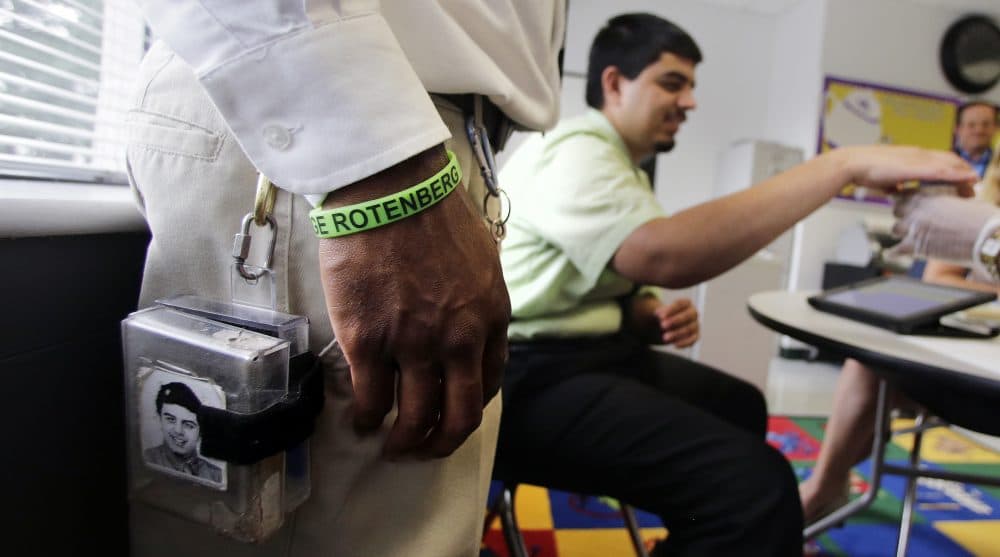Advertisement
Boston's Morning Newsletter
What to know about the FDA's new effort to ban a shock device only used at this Mass. school

Editor's Note: This is an excerpt from WBUR's daily morning newsletter, WBUR Today. If you like what you read and want it in your inbox, sign up here.
The nasturtiums are hanging, the duck boats are rolling and the Red Sox are 1-0. Oh, and it’s Friday! As the rain tempers off and we head into blue skies (and Easter) this weekend, let’s get to the news:
Round two: The FDA is going back to battle with a Massachusetts school over a controversial electrical shock device. This week, the federal agency proposed a new ban on “electrical stimulation devices intended to reduce or stop self-injurious or aggressive behavior.” Currently, the devices are used at only one school, hospital or facility in the country: Canton’s Judge Rotenberg Education Center for students with emotional and intellectual disabilities.
- What to know about the devices: An estimated 50 students at the Rotenberg school currently have a treatment plan involving the potential use of shock devices. As Here & Now reported in 2021, students at the residential school wear backpacks equipped with the devices around the clock. And workers remotely can trigger the shocks in response to a range of unwanted behaviors.
- An outdated approach? Rotenberg school leaders argue the treatment is reserved for students “for whom all other treatment options have been tried and failed.” However, according to the FDA, the shock devices raise psychological risks, like depression, PTSD and worsening of underlying symptoms. Outside experts say the field has moved toward a focus on building new behaviors. “If you’re punishing somebody, their aggressive motivations or behavior might just be right under the surface and they may not learn new ways to behave,” Leo Sarkissian, the executive director of the Arc of Massachusetts, told WBUR’s Amy Sokolow.
- This isn’t the first battle over the issue. The FDA first issued a ban on the shock devices in 2020, following court cases, petitions and a 2012 viral video. In response, the Rotenberg took the agency to court — and won. School leaders say they are “confident that we will once again prevail.” Meanwhile, the FDA — which expects to issue a formal rule later this year — says it has more clinical evidence to back up the ban now.
It’s official: The MBTA is expanding half-off fares to all low-income riders, starting sometime this summer. WBUR’s Zeninjor Enwemeka has more details about how the newly approved program will work.
- In related news: The final new Red and Orange line cars are now not expected to arrive until the end of 2027. (That’s four years later than the project’s original completion date.) The new timeline is part of a “reset” contract the T signed with Chinese carmaker CRRC, which has been hindered by manufacturing problems, tariffs, COVID and inflation. Without the new deal, T officials say it would likely take even longer to finish the project.
- Heads up: Speaking of the Red and Orange lines, both will be partially offline this weekend. Shuttle buses will replace Orange Line trains between Forest Hills and Ruggles for signal work. Meanwhile, shuttles will also replace the same chunk of the Red Line as last weekend — as well as all commuter rail service between South Station and Braintree — so crews can continue demolition work on the Dorchester Avenue Bridge.
You heard it here first: As she hinted during last week’s WBUR town hall, Mayor Michelle Wu is filing a home rule petition to allow Boston to — temporarily — increase property tax rates on businesses beyond the state limit. The move is intended to prevent a potentially dramatic spike in resident property tax rates, due to an expected shortfall in business property tax revenue from empty offices.
- The change needs the State House’s sign-off. And as Zeninjor (who was busy yesterday) reports, the reaction from local businesses has been mixed. But the move isn’t unprecedented; Boston got state approval for a similar change in 2004.
PSA: Not eager to get a colonoscopy? There are other ways to get screened for colon cancer. That’s the message of a new awareness campaign by Boston health officials aimed at combating one of the few known preventable cancers. While colonoscopies are the “gold standard test,” health officials are trying to nudge people with average or unknown risk of colon cancer to consider “stool-based” tests.
- Zoom in: The campaign is focusing on predominantly Black communities, after a 2023 report found Black Bostonians had the highest colorectal cancer mortality rate of any group in the city.
P.S.— What event was predicted to add nearly $18 million into Boston’s economy this week? Take our Boston News Quiz and test your knowledge of this week’s stories.
